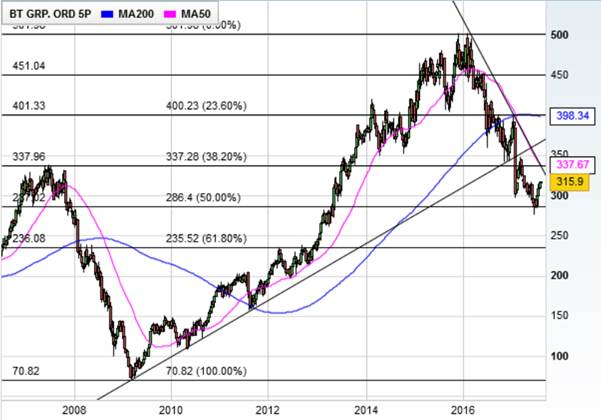How BT shares could rocket 42% to 450p
9th August 2017 12:56
by Graeme Evans from interactive investor
Share on
These are tough times for rank-and-file shareholders, who have endured one disappointment after another in recent months. With shares now a far cry from the 500p touched in November 2015, investors are wondering if the telecoms group will ever turn the corner.
However, there may be a glimmer of hope. Step forward the European telecom services team at Barclays, who have highlighted three reasons why BT may be near - if not at - the bottom.
In a note published today, Barclays has taken a closer look at the outlook for Openreach's regulated prices, alongside the cost of payments to service providers relating to delays in connecting them on time. The third point covers that perennial BT headache - the pension scheme deficit.
The outlook for these three issues amount to "small positives", according to Barclays, but are not yet sufficient to trigger a revision in its forecasts. Retaining their 'overweight' rating, analysts pencil in a small drop in earnings per share in the year ending March 2018 to 28.3p. That puts them on a forward price/earnings (PE) ratio of about 11.2 times, broadly in line with EU incumbent peers.
However, the broker continues to see potential upside of more than 40% to 450p. That's significant given recent events.
It also chimes with observations made by our resident technical analyst John Burford, who recently shared his thoughts on what must happen with the share price chart for such an objective to be achieved.

Most of the pain stems from revelations of an accounting scandal at BT Italia, which caused shares to slump 21% in January and recently prompted £225 million in warranty payments to and , who became shareholders after EE's sale to BT.
A further blow came in March when regulator Ofcom issued BT with a record fine of £42 million for reducing compensation payments to other telecoms providers for late installation.
BT had used a loophole called deemed consent, which competitors successfully argued the company had exploited. The matter resulted in BT having to book a £300 million exceptional charge in its 2018 accounts to cover potential refunds.
However, Barclays suggested today that this figure may be too high, particularly in light of Virgin Media owner yesterday booking a positive one-off of £22 million in its Q2 results, which is likely to relate to this issue. As Liberty is one of the largest parties involved, Barclays said this could, in fact, imply a total cost to BT in the region of £150 million.
On the other regulatory issue flagged by Barclays, today's note hinted that there may be limited further downside risk on the prices imposed on BT's regulated division Openreach.
Barclays said: "Openreach's regulated prices have been consistently reduced by Ofcom over the past two years, driving lower returns.
"However, from Openreach's FY17 regulatory statements we are encouraged to see that BT's return on capital for charge-controlled services is now just 10.4%. This is close to the expected cost of capital of 9%-10% and implies limited further downside risk, in our view."
On the pension issue, Barclays noted press reports last month suggesting that the company was preparing to close its defined benefit scheme for existing members. This accounts for about 33,000 of the plan's 300,000-strong membership.
Barclays said: "This would likely not change the total size of the deficit but would likely reduce annual service costs and cap liabilities."
This article is for information and discussion purposes only and does not form a recommendation to invest or otherwise. The value of an investment may fall. The investments referred to in this article may not be suitable for all investors, and if in doubt, an investor should seek advice from a qualified investment adviser.